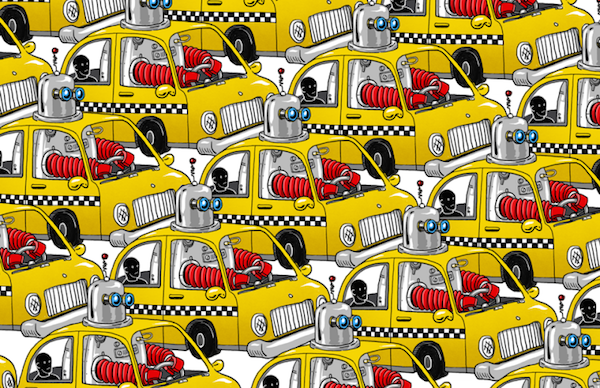There is an apocryphal story about Henry Ford II and Walter Reuther, the Union Head for the Ford Motor Company, touring a new factory. The two are looking over a balcony at an assembly line of robots when Ford turns to Reuther and says, “Hey Walter, how are you going to get those robots to pay your union dues?” Walter pauses for a minute and then replies, “Hey Henry, how are you going to get them to buy cars?”
This parable pinpoints the fundamental economic issue caused by phasing out human labour, a problem that is more relevant today than ever. A University of Toronto study released this past November predicts that within the next 15 years, up to 41 per cent of Canadian jobs will be at risk of being phased out due to automation. Despite these mounting concerns, the Canadian government is doing nothing to prevent an unemployment disaster that could dwarf the likes of the Great Depression. The casualties of this change will be the millions of truck drivers, factory workers, and fast food employees who will be left unemployed. Therefore, the Canadian government has to prepare for a shift away from a service-based economy towards an information-based economy.
2016 saw massive amounts of innovation in the field of artificial intelligence. Google’s AlphaGo beat Grand Master Lee Sedol at Go—a game 300 times more complex than chess. Uber purchased Otto—a company that manufactures driverless long-haul trucks. Meanwhile Tesla and Google both unveiled their prototypes for autonomous cars. The growth of artificial intelligence in the past decade has made the use robots for jobs viable where it wasn’t before. Fields like transportation, service, and manufacturing have all become susceptible to job automation.
As much as we humans may not want to admit it, computers are better than us in a lot of ways when it comes to our jobs. They don’t make mistakes, they don't want dental plans, and they don't hit on Janice from accounting. Computers are essentially model employees. So it should come as no surprise that more and more companies are opting to replace human labour with that of robots.
From an economic standpoint, the issue with job loss to machines isn't that labourers don’t have jobs. It is that these newly-unemployed labourers don’t have any money to spend to help grow the economy. Among economists, the widely agreed-upon solution to this is basic income. As the most fundamental form of social security, basic income is an unconditional salary paid out to the population of a country. The idea is that every week, an individual would receive a paycheck from the government simply for being a Canadian citizen. With this solution, unemployed labourers may not have a job, but they will have money to spend, curbing the negative effects of technological unemployment. The federal government has yet to tackle the partisan issue of basic income, leaving the fate of millions of Canadians up in the air.
However, basic income is a short-term band-aid for the structural unemployment caused by automation. A more long-term approach, which has also been neglected by provincial governments, is that of offering more relevant public education. The automation of jobs can only go so far. The reality of the situation is that there are many skills—such as abstract thought, complex problem solving and human interfacing—where robots are still inadequate when compared to humans. In spite of this fact, public schools still continue to teach to standardized tests, championing memorization and regurgitation over the less tangible skills required in the evolving job market.
Unemployment induced by automation will only continue to grow in Canada. There are solutions to the problem that requires preemptive action at a federal and provincial level, but if the government continues to bury its head in the sand, it may be too late.









